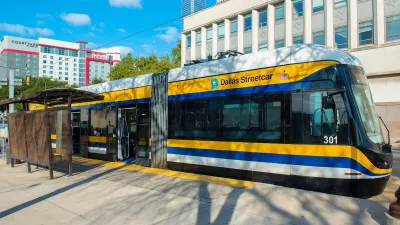The Dallas City Council ponders a form-based code, designed to encourage neighborhoods where driving isn't required to get around.
"Planners are eager for the city to implement what is known as "form-based zoning" because they think it will help move the city away from its history of developing around the automobile, with stores, homes and offices at far remove.
"After several hours of discussion Wednesday at a City Council meeting, Mayor Tom Leppert decided that the council will vote at its Dec. 10 meeting on a new form-based zoning ordinance.
"Despite significant differences between city planners and a broad-based coalition of developers, neighborhood representatives, preservationists and others, there is agreement that Dallas needs to make it simpler to build classic urban neighborhoods of the style seen in most major American cities.
"'We haven't created [in large numbers] the type of neighborhoods where people can live and work and shop without getting into their cars,' said Theresa O'Donnell, director of Dallas's Development Services department.
"For too long, Dallas zoning laws have been based on a building's use rather than how it looks and functions in connection with the buildings around it and the city in general, Ms. O'Donnell said.
"By using form-based zoning, developers would be able to build neighborhoods where the look and function of the buildings are more important than what happens inside of them."
FULL STORY: Dallas zoning proposal aims for urban living

Manufactured Crisis: Losing the Nation’s Largest Source of Unsubsidized Affordable Housing
Manufactured housing communities have long been an affordable housing option for millions of people living in the U.S., but that affordability is disappearing rapidly. How did we get here?

Americans May Be Stuck — But Why?
Americans are moving a lot less than they once did, and that is a problem. While Yoni Applebaum, in his highly-publicized article Stuck, gets the reasons badly wrong, it's still important to ask: why are we moving so much less than before?

Using Old Oil and Gas Wells for Green Energy Storage
Penn State researchers have found that repurposing abandoned oil and gas wells for geothermal-assisted compressed-air energy storage can boost efficiency, reduce environmental risks, and support clean energy and job transitions.

Updating LA’s Tree Rules Could Bring More Shade to Underserved Neighborhoods
A new USC study finds that relaxing Los Angeles’ outdated tree planting guidelines could significantly expand urban tree canopy and reduce shade disparities in lower-income neighborhoods, though infrastructure investments are also needed.

California's Canal Solar Projects Aim to Conserve Resources and Expand Clean Energy
California’s Project Nexus has begun generating electricity from solar panels installed over irrigation canals, with researchers and state agencies exploring statewide expansion to conserve water and boost clean energy production.

HHS Staff Cuts Gut Energy Assistance Program
The full staff of a federal program that distributes heating and cooling assistance for low-income families was laid off, jeopardizing the program’s operations.
Urban Design for Planners 1: Software Tools
This six-course series explores essential urban design concepts using open source software and equips planners with the tools they need to participate fully in the urban design process.
Planning for Universal Design
Learn the tools for implementing Universal Design in planning regulations.
Heyer Gruel & Associates PA
City of Moreno Valley
Institute for Housing and Urban Development Studies (IHS)
City of Grandview
Harvard GSD Executive Education
Salt Lake City
NYU Wagner Graduate School of Public Service
City of Cambridge, Maryland





























